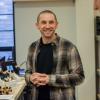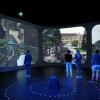Feature
 Assistant professor Michael Rivera is one of 18 joining the 2026 RIO Faculty Fellow cohort.
Assistant professor Michael Rivera is one of 18 joining the 2026 RIO Faculty Fellow cohort. Grace Leslie noted that "for people living with Alzheimer’s or dementia, both anecdotal and experimental evidence point to the durability of music in the brain."
Grace Leslie noted that "for people living with Alzheimer’s or dementia, both anecdotal and experimental evidence point to the durability of music in the brain."- Computational Foundations I teaches code as a technical and expressive skill.
- Living Matter Lab designs nanorobots for DNA production to speed biomedical research.
- ATLAS PhD student studies how brain activity syncs when musicians perform together.
 Hye-Young Jo of computer science and the ATLAS Institute will be using the funding to research human-computer interactions.
Hye-Young Jo of computer science and the ATLAS Institute will be using the funding to research human-computer interactions.- ATLAS PhD candidate Casey Hunt brings STEM learning to local classrooms with Lego robotics.
 ATLAS faculty–led seminar challenges first-year engineering students to explore the power of language in a digital age.
ATLAS faculty–led seminar challenges first-year engineering students to explore the power of language in a digital age.- Cereal-fueled celebration draws gamers of all ages to explore the frontiers of game design.
 ATLAS PhD student David Hunter researches novel ways to interact with different moments in time across a single video stream.
ATLAS PhD student David Hunter researches novel ways to interact with different moments in time across a single video stream.


